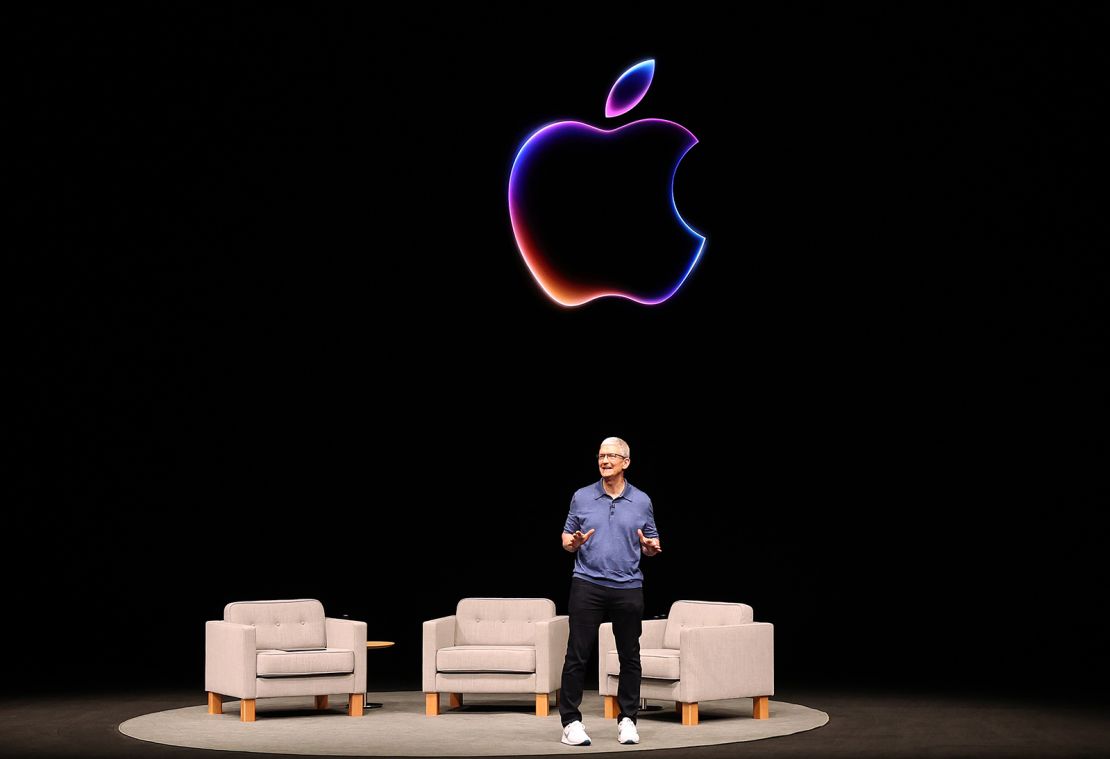CNN
—
US President Donald Trump has boasted “jobs and factories will come roaring back” as he unleashed unprecedented tariffs around the world during his “Liberation Day” address.
With his sweeping global tariffs now in effect, steep price hikes on products ranging from clothing to electronics could largely be borne by American consumers. Now, a prominent tech analyst has warned that the price of an Apple iPhone could soar to around $3,500 if they were made in the US.
The president and his economic officials have promised that, as a result of the tariffs, numerous manufacturing jobs will eventually be “reshored” to US, employing millions of Americans.
But Dan Ives, global head of technology research at financial services firm Wedbush Securities, told CNN’s Erin Burnett that the idea is a “fictional tale.”
US-made iPhones could cost more than three times their current price of around $1,000, he added, because it would be necessary to replicate the highly complex production ecosystem that currently exists in Asia.
“You build that (supply chain) in the US with a fab in West Virginia and New Jersey. They’ll be $3,500 iPhones,” he said, referring to fabrication plants, or high-tech manufacturing facilities where computer chips that power electronic devices are normally made.
And even then, it would cost Apple about $30 billion and three years to move just 10% of their supply chain to the US to begin with, Ives told Burnett on Monday. CNN has reached out to Apple for comment.
<div data-uri="cms.cnn.com/_components/video-resource/instances/cm99jxcu2000z3b6r13re734s@published" data-component-name="video-resource" data-editable="settings" class="video-resource" data-fixed-ratio="16×9" data-parent-uri="cms.cnn.com/_components/video-resource/instances/cm98h1c6100003b8rsmme5ksv@published" data-video-id="me753332e5bc4f3ff8494261b100e7540b9c40b634" data-media-id="me753332e5bc4f3ff8494261b100e7540b9c40b634" data-live="" data-analytics-aggregate-events="true" data-custom-experience="" data-asset-type="hlsTs" data-auth-type="none" data-content-type="mediasource-clip" data-medium-env="" data-autostart="unmuted" data-show-ads="true" data-source="CNN" data-featured-video="true" data-headline="Expert predicts how much an iPhone would cost if it was made in the US" data-has-video-player="true" data-description="<p>Dan Ives, Global Head of Technology Research at Wedbush Securities, explains how President Donald Trump's tariffs on Chinese goods imported into the US will affect Apple.</p>" data-duration="02:17" data-source-html='<span class="video-resource__source"> – Source:
<a target="_self" href="https://www.cnn.com/" class="video-resource__source-url">CNN</a>
</span>' data-fave-thumbnails='{"big": { "uri": "https://media.cnn.com/api/v1/images/stellar/prod/2024-09-20t042528z-164897220-rc204aalqazx-rtrmadp-3-apple-china.JPG?c=16×9&q=h_540,w_960,c_fill" }, "small": { "uri": "https://media.cnn.com/api/v1/images/stellar/prod/2024-09-20t042528z-164897220-rc204aalqazx-rtrmadp-3-apple-china.JPG?c=16×9&q=h_540,w_960,c_fill" } }' data-vr-video="false" data-show-html="” data-byline-html='<div
data-uri=”cms.cnn.com/_components/byline/instances/cm98h1cap00013b8r3ygdownm@published”
data-component-name=”byline”
class=”byline vossi-byline”
data-editable=”settings”
>
</div>’ data-timestamp-html='<div
class=”timestamp vossi-timestamp”
data-uri=”cms.cnn.com/_components/timestamp/instances/cm98h1cau00063b8raplfid8n@published”
data-editable=”settings”
>
Published
2:36 AM EDT, Wed April 9, 2025
</div>’ data-check-event-based-preview=”” data-is-vertical-video-embed=”false” data-network-id=”” data-publish-date=”2025-04-08T13:34:41.094Z” data-video-section=”politics” data-canonical-url=”https://www.cnn.com/2025/04/08/politics/video/trump-tariffs-apple-iphone-prices-digvid” data-branding-key=”” data-video-slug=”trump-tariffs-apple-iphone-prices-digvid” data-first-publish-slug=”trump-tariffs-apple-iphone-prices-digvid” data-video-tags=”” data-breakpoints='{“video-resource–media-extra-large”: 660}’ data-display-video-cover=”true” data-details=””>

The making and assembly of smartphone parts shifted to Asia decades ago, as American companies largely focused on software development and product design, which generate much higher profit margins. That move has helped make Apple one of the world’s most valuable companies and cement itself as a dominant smartphone maker.
Since Trump’s inauguration in late January, Apple’s shares have lost around 25% of their value due to concerns about the impact of tariffs on its sprawling supply chain, which is highly dependent on China and Taiwan. About 90% of iPhones are assembled in China.
“That’s why I think you see what’s happened to the stock, because no company is more caught up in this tariff front and center in this category five storm than Cupertino and Apple,” he said. “It’s an economic Armageddon, but especially for the tech industry.”
The chips that power iPhones are mainly manufactured in Taiwan, while its screen panels are supplied by South Korean companies. Some other components are made in China, and final assembly mostly takes place in the country.
In February, Apple announced it would invest $500 billion in the US over the next four years as part of its effort expand production outside China and to avoid Trump’s tariffs on the country.

Tech analysts agree that iPhone prices are likely to rise, even if supply chains stay where they are. Rosenblatt Securities, a New York-based investment bank, said iPhones could be 43% more expensive, should Apple pass on the entire cost of higher tariffs to consumers, according to a research note cited by Reuters.
Neil Shah, vice president of research at Counterpoint Research, estimates that iPhone could cost about 30% more, but this could depend on where they are made.
Apple has previously been seeking to diversify its production bases from China to India and Brazil and could look to shift production of key components to countries that face lower tariff barriers to keep the cost of its phones down. India faces 26% tariffs, whereas Brazil has been hit with 10%. Although Trump’s tariffs on Brazil are the lowest among key iPhone manufacturing centers, it probably doesn’t produce enough capacity to fill the gap left by China, Shah said.


